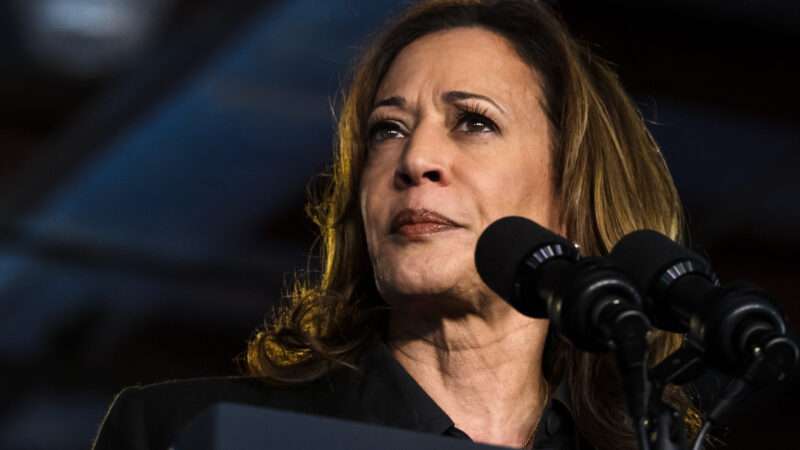
Vice President Kamala Harris is an ideas candidate. That's what a string of recent opinion pieces about her economic agenda try to convince us of anyway.
In a Tuesday column, The Washington Post's Heather Long writes that she sees in Harris' "opportunity economy"—that grab bag of subsidies to businesses large and small, price controls on food and housing, tariffs on imported goods, tax credits for parents, and a call to build 3 million new homes—a coherent philosophy of "fair capitalism" or "middle-class capitalism."
Harris is breaking from the left-right dichotomy, says Long, with her plan to both build things and create new subsidies. Her task now is "to define her economic philosophy so that voters can see it—and understand how they fit into it."
In that same vein, a few weeks earlier in The New York Times, former Biden administration economic advisor Jen Harris elaborated on how Vice President Harris was creating a whole new brand of economics focused on "building" (literally building housing, renewable energy, etc.) and "balancing" (price controls, antitrust enforcement, etc.).
Building "focuses on pointing and shaping markets toward worthy aims," while balancing "corrects upstream power imbalances so that market outcomes are fairer and need less after-the-fact redistribution," she writes.
By fusing these strands together, Harris is "telling a more holistic and entirely new story about how the economy works and the aims it should serve," reads the Times column.
Is she really?
Harris would hardly be the first presidential candidate, or even the first Democratic presidential candidate, to pitch herself as a champion of the middle class. In a middle-class country, that's pretty standard political rhetoric.
Likewise, every Democratic president, from Barack Obama to John F. Kennedy, has called for some mix of economic growth, government investment, redistribution, and regulation.
Harris might be talking more about building housing and antitrust enforcement than past Democratic candidates, but she's still following a well-worn playbook.
Indeed, Harris' few concrete economic policies look less like a coherent philosophy and more like a confused self-defeating agenda.
The vice president says she wants to make housing more affordable by building more units and capping rent increases on existing units. But rent control has a well-earned reputation for reducing new construction. One plank of Harris' housing affordability agenda is working against the other.
That seems like less "building" and "balancing" and more like just building less.
And if "upstream" antitrust enforcement is supposed to lessen the need for redistribution, as Jen Harris claims in her Times column, why is Kamala Harris still proposing a raft of new subsidies and tax credits? Despite all that building and balancing, we still need more redistribution too, I guess.
This all smacks of contradiction, not synthesis.
Perhaps the most direct argument against Harris being an ideas candidate with an economic philosophy all her own is that she never articulates what that philosophy is.
When asked about her "opportunity economy" in the rare interviews that she has done, Harris struggles to say what the idea is beyond retelling her personal story and rehashing her calls for a couple of additional subsidies.
Take the interview Harris just did last week with 6ABC Philadelphia anchor Brian Taff. Taff asks Harris to name two policies she has for bringing down prices and making things more affordable for people.
In response, Harris talks for nearly two minutes about her upbringing in a middle-class Oakland neighborhood before eventually getting around to mentioning her plan to give tax credits and subsidies to new small businesses, home builders, and home purchasers.
This, Harris says, will help people further their own "dreams and aspirations."
She said something similar when asked by CNN's Dana Bash about what she would do on her first day in the White House.
Harris said to Bash: "I will tell you first and foremost one of my highest priorities is to do what we can to support and strengthen the middle class. When I look at the aspirations, the goals, the ambitions of the American people, I think that people are ready for a new way forward in a way that generations of Americans have been fueled by—by hope and by optimism."
When pressed by Bash for one specific action, Harris reeled off some more boilerplate about bringing costs down and investing in families before mentioning her specific policy proposal for a $6,000 child tax credit.
There's a lot more pandering and pablum in Harris' answers than any philosophizing about the structure of the economy.
The most obvious takeaway isn't that Harris has some new-fangled approach to economic policy. Rather, it's that she unexpectedly found herself at the top of the Democratic ticket and has been grasping for a policy agenda ever since.
In the rush to cobble that agenda together, she's picked up on some relatively fresh ideas (help the private sector build more homes), some stale ones (homebuyer and small business subsidies), and a few already tried disasters (price controls).
But there's no coherent idea connecting these policies. Columnists can do all the heavy lifting they want to try and find a connecting thread. But the fact is there is just no there there.
The post Kamala Harris Is Not an Ideas Candidate appeared first on Reason.com.







